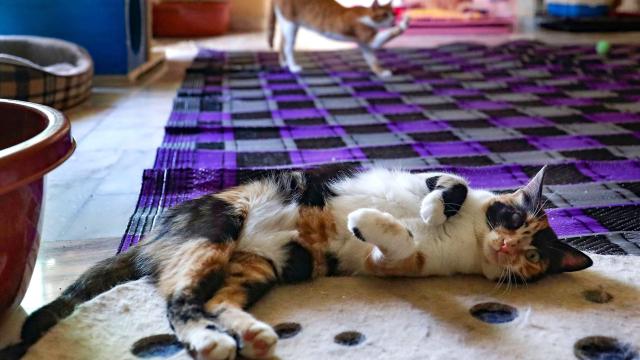Feline lovers with furry families can now put their communication skills to the test. Scientists in California are hoping to recruit volunteers who own exactly two cats for their experiment, which will primarily involve just watching some cat videos. The hope is that this research will reveal how well the typical owner can interpret cat-to-cat interactions, including those that could become aggressive, and ultimately help owners better understand their cats.
Scientists at the University of California Davis and The University of British Columbia are seeking people living in the U.S. or Canada, over the age of 18, who are the primary owner of two adult cats.
These volunteers will watch a series of 10 videos “showcasing various types of positive and negative cat-cat interactions,” according to an outline of the study’s design posted online by the team. Then they’ll have to rate the behaviours on a scale from extremely positive to extremely negative. Afterward, they’ll be surveyed about their own cats and asked how often they show similar behaviours. Meanwhile, the researchers will compare the responses they get from the volunteers to those from trained cat behaviorists with PhDs. The researchers hope to test whether owners ever have trouble interpreting cat body language, using the experts’ responses as a baseline.
People are often recommended to own multiple cats, since they can form healthy social bonds with one another and avoid boredom when the owners are away. But not all pairings turn out well, especially when the cats aren’t from the same litter. Vets rely on the accounts of owners to spot problems that could arise from an uncomfortable relationship between cats, including aggression so severe that the cats get hurt or are given up for adoption.
“The welfare of cats in the home is an under-researched area,” study researcher Sherry Khoddami, a student at British Columbia’s Applied Animal Biology Program, told Gizmodo in an email. “From providing access to resources (such as food, water, litter, perches, resting areas, and more) to recognising problem behaviours between their cats and interfering when necessary. We want to know how knowledgeable owners are of the resources their cats need and at identifying positive and negative behaviours displayed by their cats.”
While there is no financial compensation for this study, cat lovers may indirectly benefit from it down the line, according to Khoddami.
“Ultimately, we hope this research can help identify gaps in owners’ knowledge of cat behaviour. The misconception that cats are independent and like to be left alone is outdated, and we need to provide cat-owners with more educational resources to ensure their cats’ welfare in the home,” she said. “As people adopt more pets during these hard times, it’s key for shelters, veterinarians, and other professionals to give cat owners access to these resources.”
The authors hope to get thousands of participants before the study’s end, with an expected timeline for publishing their work by early 2022.
A link to the study’s enrollment can be found here, and it should take no more than 10 to 15 minutes to complete. And if you’re not eligible but love cats and science, you can keep a lookout for the results of an upcoming study that recruited cats and dogs to explore their reactions to optical illusions.
